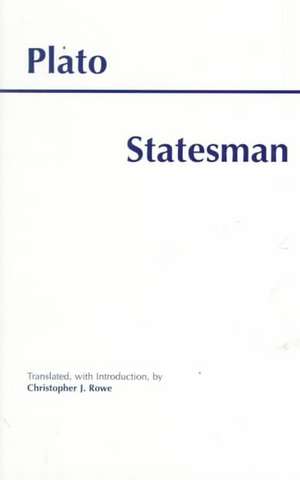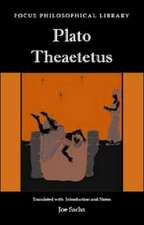Statesman
Autor Plato Traducere de Christopher Roween Limba Engleză Paperback – 15 mar 1999
| Toate formatele și edițiile | Preț | Express |
|---|---|---|
| Paperback (12) | 46.18 lei 3-5 săpt. | |
| – | 46.18 lei 3-5 săpt. | |
| CREATESPACE – | 47.00 lei 3-5 săpt. | |
| – | 57.75 lei 3-5 săpt. | |
| CreateSpace Independent Publishing Platform – | 74.93 lei 3-5 săpt. | |
| Hackett Publishing Company – 15 mar 1999 | 79.07 lei 3-5 săpt. | +12.79 lei 5-11 zile |
| Hackett Publishing Company, In – 14 oct 1992 | 92.48 lei 3-5 săpt. | |
| Hackett Publishing Company – 15 mar 2012 | 94.03 lei 3-5 săpt. | |
| ALPHA EDITION – 27 aug 2024 | 100.12 lei 3-5 săpt. | |
| Echo Library – 3 oct 2006 | 69.94 lei 38-44 zile | |
| 1st World Library – | 79.19 lei 6-8 săpt. | |
| Akasha Classics – 11 noi 2009 | 99.33 lei 6-8 săpt. | |
| TREDITION CLASSICS – 31 oct 2011 | 145.52 lei 6-8 săpt. | |
| Hardback (4) | 173.34 lei 6-8 săpt. | |
| Hackett Publishing Company – 15 mar 1999 | 209.03 lei 3-5 săpt. | |
| Hackett Publishing Company – 15 oct 1992 | 210.42 lei 3-5 săpt. | |
| 1st World Library – | 173.34 lei 6-8 săpt. | |
| Akasha Classics – 11 noi 2009 | 195.85 lei 6-8 săpt. |
Preț: 79.07 lei
Preț vechi: 86.27 lei
-8% Nou
Puncte Express: 119
Preț estimativ în valută:
15.13€ • 15.74$ • 12.49£
15.13€ • 15.74$ • 12.49£
Carte disponibilă
Livrare economică 24 martie-07 aprilie
Livrare express 08-14 martie pentru 22.78 lei
Preluare comenzi: 021 569.72.76
Specificații
ISBN-13: 9780872204621
ISBN-10: 0872204626
Pagini: 128
Dimensiuni: 9 x 215 x 6 mm
Greutate: 0.14 kg
Ediția:Rev ed.
Editura: Hackett Publishing Company
Colecția Hackett Publishing Company, Inc (US)
ISBN-10: 0872204626
Pagini: 128
Dimensiuni: 9 x 215 x 6 mm
Greutate: 0.14 kg
Ediția:Rev ed.
Editura: Hackett Publishing Company
Colecția Hackett Publishing Company, Inc (US)
Recenzii
"The original publication of Rowe's translation in 1995 was a landmark event in the study of this fascinating but enigmatic dialogue. Based on a careful and convincing revised Greek text, the contemporary English of this unpretentious, clear, and -- above all -- accurate version makes it by far the best available. In fact, Rowe's translation is now and will surely remain the only acceptable choice." -- John Cooper, Stuart Professor of Philosophy, Princeton University.
Notă biografică
Plato was an ancient Greek philosopher born in Athens during the Classical period in Ancient Greece. In Athens, Plato founded the Academy, a philosophical school where he taught the philosophical doctrines that would later become known as Platonism. Plato (or Platon) was a pen name derived, apparently, from the nickname given to him by his wrestling coach - allegedly a reference to his physical broadness. According to Alexander of Miletus quoted by Diogenes of Sinope his actual name was Aristocles, son of Ariston, of the deme Collytus (Collytus being a district of Athens).Plato was an innovator of the written dialogue and dialectic forms in philosophy. He raised problems for what later became all the major areas of both theoretical philosophy and practical philosophy. His most famous contribution is the Theory of forms, which has been interpreted as advancing a solution to what is now known as the problem of universals. He is also the namesake of Platonic love and the Platonic solids.His own most decisive philosophical influences are usually thought to have been, along with Socrates, the pre-Socratics Pythagoras, Heraclitus, and Parmenides, although few of his predecessors' works remain extant and much of what we know about these figures today derives from Plato himself.[a]Along with his teacher, Socrates, and his student, Aristotle, Plato is a central figure in the history of philosophy.[b] Unlike the work of nearly all of his contemporaries, Plato's entire body of work is believed to have survived intact for over 2,400 years.[6] Although their popularity has fluctuated, Plato's works have consistently been read and studied. Through Neoplatonism Plato also greatly influenced both Christian and Islamic philosophy (through e.g. Al-Farabi). In modern times, Alfred North Whitehead famously said: "the safest general characterization of the European philosophical tradition is that it consists of a series of footnotes to Plato.














